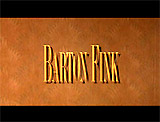
|
Barton Fink (1991)
In this Coen Brothers classic about the struggles
and efforts of a celebrated NY playwright to write a script in Hollywood,
while suffering from 'writers block' and becoming engaged in a noirish
murder mystery:
- the title character: the wiry-haired, thick-framed
black-eyeglass-wearing, celebrated New York playwright Barton Fink
(John Turturro) - after the success of his play Bare Ruined
Choirs, who had been tempted to sell out from his roots and
move west to Hollywood (of 1941) for a big payout - a contract
with Capitol Pictures; he resided temporarily in stark hotel room
# 621 (on the 6th floor) with loudly peeling wallpaper in the surreal,
rundown Hotel Earle; a clue to the film's meaning was found on
the letterhead for the hotel:
"A Day or a Lifetime" - the hotel was literally and figuratively
HELL
- the early scene of eccentric movie studio mogul Jack
Lipnick (Michael Lerner) speaking to Fink: (Lipnick: "We're
only interested in one thing. Can you tell a story? Can you make
us laugh, make us cry, make us want to break out in song?");
the East Coast writer was asked to compromise his talent by writing
a film script for a "wrestling picture with Wallace Beery" within
a week: ("We do not make B-pictures here at Capitol. Put a stop
to that rumor right now!...The important thing is we all want it
to have that Barton Fink feeling. I guess we all have that Barton
Fink feeling, but since you're Barton Fink, I'm assuming you have
it in spades")
- afterwards, Barton's condescending and lengthy rant
about theater to his gregarious, traveling, door-to-door fire insurance
salesman/psychotic homicidal next-door neighbor Charlie Meadows (John
Goodman) in the hotel, whom he called a "real man" - he
stressed his connection to the "common man": ("Strange
as it may seem, Charlie, I guess I write about people like you -
the average working stiff, the common man....There's a few people
in New York, hopefully our numbers are growing, who feel we have
an opportunity now to forge something real out of everyday experience,
create a theater for the masses based on a few simple truths, not
on some shopworn abstractions about drama that don't hold true today
if they ever did...We all have stories! The hopes and dreams of the
common man are as noble as those of any king. The stuff of life.
Why shouldn't it be the stuff of theater? God dammit. Why should
that be such a hard pill to swallow? Don't call it new theater, Charlie.
Call it real theater. Call it our theater!... many writers do everything
in their power to insulate themselves from the common man, from where
they live, from where they trade, from where they fight and love
and converse and, and, so, naturally, their work suffers and regresses
into empty formalism and - well, I'm spouting off again, but to put
it in your language, the theater becomes as phony as a $3 dollar
bill")
- the scene of Barton Fink (with mosquito bites all
over his face and suffering from terminal writer's block) consulting
with producer Ben Geisler (Tony Shalhoub) for advice about his script,
and learning to his consternation that Lipnick had unfortunately
taken an interest in the picture: ("I don't know what the hell
you said to Lipnick, but the son of a bitch likes you. Do you understand
that, Fink? He likes you! He's taken a interest. Never make Lipnick
like you. Never!...Are you deaf? He likes you. He's taken a interest.
What the hell did you say to him?...Well, he's taken a interest.
That means he'll make your life hell, which I could care less about.
Since I drew the short straw to supervise this turkey, he's gonna
be all over me, too. Fat-ass son of a bitch called me yesterday to
ask me how it's going. Don't worry, I covered for ya. I told him
you were making progress. We were all very excited. I told him it
was great. Understand that? So now my ass is on the line. He wants
you to tell him all about it tomorrow!")
- the sequences of Barton's quick love affair with new
muse Audrey Taylor (Judy Davis), the 'ghost writer' and secretary
for a well-known, alcoholic Faulknerian novelist - William Preston
(W.P.) "Bill" Mayhew (John Mahoney), whose body was later
found 'Headless in Chavez Ravine'; this grisly news headline was
followed by the scene of Barton's discovery of the bloodied body
of Audrey in his bedroom - presumably following a night of sex with
her
|
Grisly Film Components
|
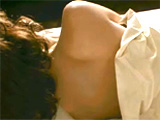
|
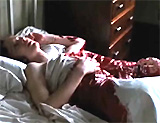
|
|
Bloodied Body of Audrey - Violently Murdered
|
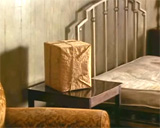
|
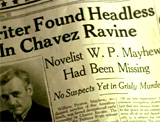
|
|
Charlie's Mysterious Brown Paper-Wrapped Box
|
Decapitated Writer's Body
|
- the fiery scene in which Fink's neighbor Charlie,
now revealed to be serial killer Karl "Madman" Mundt
("He likes to ventilate people with a shotgun and cut their
heads off") returned to the rundown hotel; the hot-tempered
Charlie emerged from the hotel's flaming elevator, and abruptly
shot one of two cops who were waiting for him there; he ran down
the flaming corridor screaming out with his double-barreled shotgun
at the second officer: ("Look upon me. I'll show you the life
of the mind!") - he pulled the trigger with the gun pointed
at the man's forehead, as he spoke:
"Heil Hitler!"; then he returned to Barton's open door,
whistled, and exclaimed: "Brother, is it hot!"
- sitting on Barton's bed, Charlie confessionally admitted
to Fink: "Most guys I just feel sorry for. It tears me up inside
to think about what they're going through, how trapped they are.
I understand it. I feel for them. So I try and help them out. Jesus...I
know what it feels like when things get all balled up at the head
office. They put you through hell, Barton. So I help people out.
I just wish someone would do as much for me. Jesus, it's hot. Sometimes
it gets so hot I want to crawl right out of my skin"; when Fink
asked: "But Charlie, why me?" - Charlie yelled back: "Because
you don't listen!"
- the last scene in which the bewildered playwright
suffered criticism, denigration, and ridicule from the studio and
the chastising Lipnick, about his inadequate finished script - "We
don't put Wally Beery in a fruity movie about suffering": ("You
ain't no writer, Fink. You're a god-damn write-off!...You arrogant
son of a bitch. You think you're the only writer that can give me
that Barton Fink feeling? I got 20 writers under contract I can ask
for a Fink-type thing from! You swell-headed hypocrite! You just
don't get it, do ya? You think the whole world revolves around whatever
rattles inside that little kike head of yours. Get him out of my
sight, Lou! I want him in town, though. He's still under contract.
I want you in town and outta my sight. Now, get lost. There's a war
on")
- the final sequence found Fink walking along a beach
with Charlie's brown paper-wrapped parcel-box (with Audrey's body
parts, or Mayhew's head, or the head of one of Charlie's murdered
victims?); there, he met a bathing beauty (Isabelle Townsend) - his
dream girl from a picture on the wall in his hotel room; after she
greeted him with "It's a beautiful day," he responded: "Yes,
it is"; then after telling her he didn't know the contents of
the box, he complimented her: "You're very beautiful. Are you
in pictures?"
to which she responded: "Don't be silly"
|
Fink's Dream Girl Bathing Beauty - From Postcard
|

|
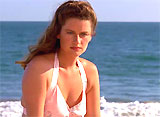
|

|
|

Hollywood's Hotel Earle Letter-head
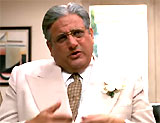
Capitol Pictures' Movie Mogul Jack Lipnick (Michael Lerner)
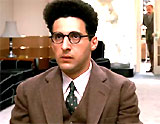
Screenwriter Barton Fink (John Turturro)

Fink's Rant To Charlie About His Connection to the "Common
Man"

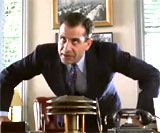
Fink's Consultation with Producer Ben Geisler: "He's
(Lipnick) taken an interest!"

Audrey Taylor - "Ghostwriter" and Secretary
for Novelist
"Bill" Mayhew
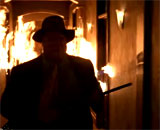

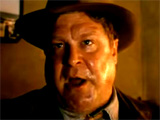
Neighbor Charlie's Shotgun Rampage in Flaming Hotel
Hallway


Fink's Final Chastisement by Lipnick About His Finished
Script ("A fruity movie about suffering")
|













